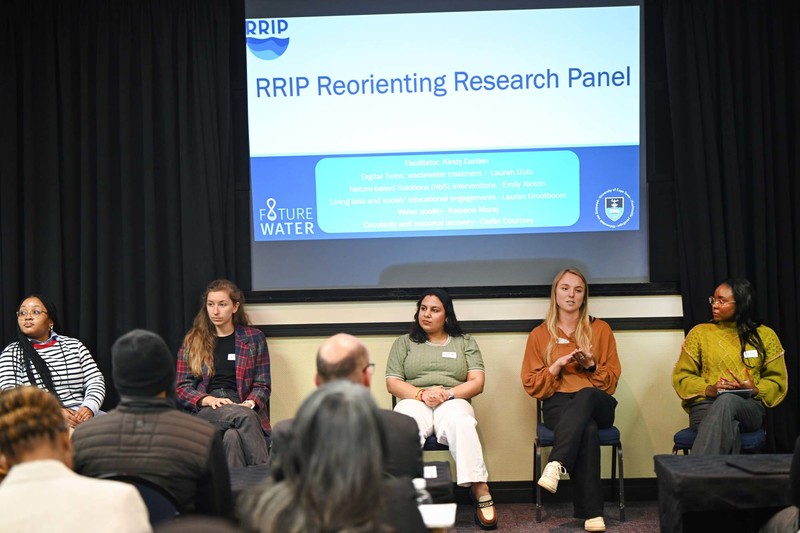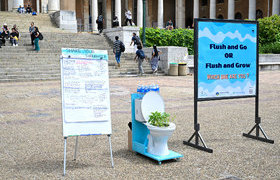Symposium unpacks partnerships and possibilities for a water-secured future in Africa
18 September 2025 | Story Lyndon Julius. Photos Lerato Maduna. Read time 6 min.
The Future Water research institute at the University of Cape Town (UCT) hosted the RRIP Futures and Partnerships Symposium on 11 and 12 September, which is a culmination of three years of collaborative research under the project Reorienting Research, Innovation & Practice (RRIP) to Address Future Water Challenges in Africa.
The symposium brought together academics, practitioners, policy makers, and community partners, highlighting both achievements and future pathways for addressing Africa’s urgent water challenges.
Dr Amber Abrams, a senior research officer in UCT’s Department of Civil Engineering and co-principal investigator (co-PI) of the RRIP programme, explained that the symposium was as much about reflection as it was about planning.
“This project was envisioned as a 10-year horizon, but our initial three years of funding allowed us to build strong foundations,” Dr Abrams said on the first day of the symposium. “The symposium is our way of showcasing the work achieved so far and of bringing our partners – NGOs, community members, city officials, and researchers – into the same room to think collectively about the future.”
The event also launched a new in-house laboratory for water quality analysis, developed in partnership with BioGrip and the South African Medical Research Council. This laboratory will enable UCT to advance cutting-edge water security research while supporting communities and municipalities.
“Water doesn’t stay separate – it mixes. Today is about bringing people and ideas together in the same way.”
Forging partnerships for the long term
Associate Professor David Ikumi from UCT’s Department of Civil Engineering and the RRIP programme’s PI, emphasised that the symposium was designed to build bridges across disciplines and sectors.
He noted that Africa’s water and sanitation challenges require transdisciplinary approaches that prioritise community-centred solutions.
“If we want real impact, we must involve communities and practitioners from the start – not after the fact.”
“This workshop is about connecting ideas – not just in one field like water treatment, but across social anthropology, governance, economics, data science, and practice,” Associate Professor Ikumi said as the first day drew to a close. “We want to inspire each other, forge strong partnerships, and create tangible pathways forward.
“You cannot come up with a solution in isolation and then expect communities to adopt it. Success requires involving practitioners and the public from the very beginning so that solutions are grounded, accepted, and sustainable in the long term.”
He added: “If we want real impact, we must involve communities and practitioners from the start – not after the fact.”
Water security as a collective endeavour
The symposium’s sessions reflected the broad scope of RRIP’s work: from wastewater treatment and circular resource recovery to social science research on governance and public participation. Multiple transdisciplinary workstreams contributed to the event, demonstrating how science, innovation, and practice can be integrated to address complex challenges.
Abrams emphasised that UCT’s leadership role lies in reimagining and continuing to pursue the university as not only a research hub but also a facilitator of dialogue between academia, government, and society.
“This project positions UCT as an institution that not only produces knowledge but also interfaces with communities and cities to co-create a water future that is sustainable and secure.”
A call to reorient research for Africa’s future
The symposium underlined that water security in Africa is not simply a matter of technology or infrastructure, but of governance, equity, and solidarity.
By bringing together key voices – from lab scientists to local community leaders – UCT and its partners have demonstrated what it means to reorient research, innovation, and practice for impact.
Beyond the immediate reflections, one of the most significant outcomes was a renewed recognition that Africa’s water future will be determined not only by research breakthroughs but also by the ability to nurture young scholars, innovators, and practitioners.
All of the speakers emphasised that the sustainability of the RRIP vision depends on equipping the next generation with the skills and networks to take forward the work initiated in these first three years.
Early-career researchers, postgraduate students, and community fellows actively participated in the discussions, showcasing innovative approaches that linked scientific methods with community knowledge and lived realities.
Their presence was a reminder that the future of water security will be shaped by inclusive participation, mentorship, and capacity building across institutions. In this sense, the symposium became more than a platform for reflection – it was a rehearsal for the future leadership of Africa’s water sector. By foregrounding the voices of emerging leaders, the symposium sent a clear message: solutions to water insecurity must be co-created across generations, geographies, and disciplines if they are to stand the test of time.
“Today is about celebrating what we’ve achieved. Tomorrow [second day of symposium] is about imagining what we can still do together. This symposium is both a culmination and a beginning. It’s about taking stock of what we’ve built and committing to what lies ahead.”
Looking ahead: sustaining the momentum
While the symposium marked the conclusion of the first funding cycle, it also opened the door to discussions on sustainability.
Abrams and Ikumi confirmed that the next phase will focus on securing new funding streams and deepening partnerships to realise the original 10-year vision.
The forward-looking workshops on the second day asked participants to brainstorm new funding opportunities, propose collaborative projects, and imagine how the lessons of the RRIP programme could be scaled nationally and across Africa.
“Building trust is at the heart of long-term collaboration,” Ikumi reflected. “By investing in partnerships now, we ensure that this work continues beyond the lifespan of any single grant.”
 This work is licensed under a Creative Commons Attribution-NoDerivatives 4.0 International License.
This work is licensed under a Creative Commons Attribution-NoDerivatives 4.0 International License.
Please view the republishing articles page for more information.















